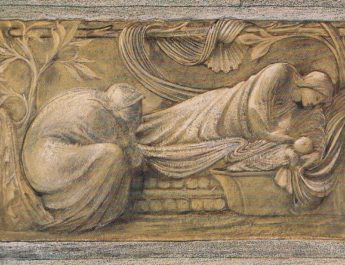Psalm 17
Ordinary A36
A PrayerA of David.B
1 HearC a just cause,D O Lord;E attendF to my cry;G
A “prayer” = tephillah. From palal (to judge for oneself or in an official capacity; to pray or make supplication, to entreat). This is prayer or intercession. It can also be a hymn.
B “David” = david. From the same as dod (beloved, love, uncle); the root may mean to boil, which is used figuratively to describe love. So, this implies someone you love such as a friend, a lover, or a close family member like an uncle. David’s name likely means something like “beloved one.”
C “hear” = shama. This is to hear, call, consent, or consider. It implies listening intelligently, giving attention, and, because of these two factors, obedience and action are often implied.
D “just cause” = tsedeq. This is rightness, righteousness, vindication. It is everything that is just or ethical. That which is right in a natural, moral, or legal sense. It also includes just weights (i.e. true weights). Figuratively, this is justice, righteousness, equity – even prosperity.
E “Lord” = YHVH. From havah (to be, become) or hayah (to come to pass, become, be). This is the name of the God of Israel, the self-existent and eternal one, the tetragrammaton. This pronunciation has been lost to time so “Lord” is generally used in its place.
F “attend” = qashab. To listen, pay attention to, incline – used in the phrase incline the ears.
G “cry” = rinnah. From ranan (a cry of joy or a joyful song; properly, emitting a shrill sound, especially one of joy). This is a song, shout, cry of joy, or proclamation. It could also be a shout of grief.
give earH to my prayer from lips free of deceit.I
2 From youJ let my vindicationK come;
let your eyes seeL the right.M
H “give ear” = azan. Perhaps from ozen (ear, hearing, audience, show; properly, broadness – applied to its ear in reference to its shape). Properly, this is to expand or broaden one’s ear i.e. listen intently, pay attention, heed.
I “deceit” = mirmah. From ramah (to betray, deceive, beguile). This is deceit, treachery, guile, or fraud
J “you” = paneh. Literally “your face.”
K “vindication” = mishpat. From shaphat (to judge, defend, pronounce judgment, condemn, govern). This is a verdict or formal sentence whether from humans or from God. It includes the act of judging as well as the place that judging takes place, the suit itself, and the penalty. Abstractly, this is justice, which includes the rights of the participants.
L “see” = chazah. This is to gaze at – to see or behold. It can also refer to perceiving as a mental process or looking at something with pleasure. It can be used particularly to mean seeing a vision.
M “right” = meshar. 19x in OT. From yashar (to be straight, right, even, agreeable). This is evenness, straightness, prosperity, or uprightness.
3 If you tryN my heart,O if you visitP me by night,Q
N “try” = bachan. This is to examine, test, or prove – as one tests metals. It can also be used literally or figuratively for investigating or trying.
O “heart” = leb. May be related to labab (to encourage; properly, to be encased as with fat; used in a good sense, this means to transport someone with love; used in a bad sense, it can mean to dull one’s senses). This is the heart, courage, one’s inner self, the mind, or the will. Heart is only used in a figurative sense in the Old and New Testaments.
P “visit” = paqad. This is to attend to or visit – can be used for a friendly or violent encounter. So, it can be to oversee, care for, avenge, or charge.
Q “night” = layil. Properly, this refers to light twisting away. It is used for night or midnight. Figuratively, this can mean adversity.
if you testR me, you will findS no wickednessT in me;
my mouth does not transgress.U
R “test” = tsaraph. This is to refine, smalt, or fuse metal. It can also refer to the smelter (goldsmith or silversmith). Figuratively, this is refine in a literal or figurative sense – to test or try, make pure.
S “find” = matsa. This is to find, catch or acquire. It can also mean to come forth or appear. Figuratively, this can mean to meet or be together with.
T “wickedness” = zamam. This is to devise, plot, imagine, intend, scheme, think evil. It is usually used in an evil sense
U “transgress” = abar. This is to pass over or cross over. It is used for transitions, whether literal or figurative. It can also mean to escape, alienate, or fail. This is the root verb from which “Hebrew” is drawn.
4 As for what othersV do,W by the wordX of your lips
I have avoidedY the waysZ of the violent.AA
V “others” = adam. Perhaps from adam (to be red, make ruddy); related to adamah (ground, dirt, earth). This is man, humankind, also Adam’s name. It refers to a human individual or humanity.
W “what…do” = peullah. 14x in OT. From paal (to do, make, work, or accomplish; generally refers to regularly repeated or systematic action – to practice). This is work, deed, reward, or wages.
X “word” = dabar. From dabar (to speak, declare, discuss). This is speech, a word, a matter, an affair, charge, command, message, promise, purpose, report, request. It is a word, which implies things that are spoken of in a wide sense.
Y “avoided” = shamar. This is to keep, watch, or preserve. It means to guard something or to protect it as a thorny hedge protects something.
Z “ways” = orach. From arach (to go, travel, wander). This is a road that is widely used, highway, caravan, traveler, troop.
AA “violent” = parits. 6x in OT. From parats (to make a breach, burst out, compel, disperse; to break out literally or figuratively). This is violent, vicious or one who is violent like a robber, tyrant, or destroyer.
5 My steps have held fastBB to your paths;CC
my feetDD have not slipped.EE
BB “held fast” = tamak. This is to sustain, support, maintain, grasp. Figuratively, it can be to help or uphold.
CC “paths” = magal. 16x in OT. From the same as agol (round). Older root may mean to revolve. This is a path or course. It is a track in a literal or figurative sense. Could also refer to a rampart because it is circular.
DD “feet” = paam. From paam (to move, trouble; to tap in a regular rhythm; to agitate). This is a beat, stroke, footstep, or occurrence.
EE “slipped” = mot. This is to shake, slip, falter, stagger, move, fall, give way, waver, be carried.
6 I call uponFF you, for you will answer me, O God;GG
inclineHH your earII to me, hear my words.JJ
FF “call upon” = qara. This is to call or call out – to call someone by name. Also used more broadly for calling forth.
GG “God” = el.
HH “incline” = natah. This is to stretch or spread out, to extend, or bend. In can also imply moral deflection.
II “ear” = ozen. Related to “give ear” in v1. See note H above.
JJ “words” = imrah. From emer (speech, thing, utterance, promise, argument, command); from amar (to speak, say, answer, command, promise, report). This is any kind of utterance, a word or commandment.
7 Wondrously showKK your steadfast love,LL
O saviorMM of those who seek refugeNN
from their adversariesOO at your right hand.PP
KK “wondrously show” = palah. 7x in OT. This is to distinguish in a literal or figurative sense. It can also be to sever, set apart, or show self to be marvelous.
LL “steadfast love” = chesed. From chasad (being good, kind, merciful; may mean bowing one’s neck as is done in the presence of an equal for courtesy’s sake; so, if one in a superior position is treating you like an equal, that is what is captured here). This is favor, goodness, kindness, loving kindness, pity, reproach, or a good deed. When done by God to humanity, this is mercy/loving kindness. When done by humanity to God, it is piety.
MM “savior” = yasha. To deliver, defend, help, preserve, rescue, be safe. Properly, to be open, wide or free, which implies being safe. Used causatively, it means to free.
NN “those who seek refuge” = chasah. This is to take refuge or flee for protection. Figuratively, it means to hope or trust in someone or something.
OO “adversaries” = qum. To arise, stand, accomplish, establish, abide. This is rising as in rising against, getting up after being sick or asleep, arising from one state to another, becoming powerful, or rising for action. It can also be standing in a figurative sense.
PP “right hand” = yamin. May be from yamam (to go or choose the right, use the right hand; to be physically fit or firm). This can mean right hand, right side, or south. Since most people are right-handed, the metaphorical usage of this word presumes that the right hand is stronger and more agile. Thus, it is the instrument of power and action.
8 GuardQQ me as the appleRR ofSS the eye;
hideTT me in the shadowUU of your wings,VV
QQ “guard” = shamar. Same as “avoided” in v4. See note Y above.
RR “apple” = ishon. 5x in OT. From ish (man); perhaps from enosh (human, humankind, mortal); from anash (to be weak, sick, or frail). This is middle. It could be the pupil as the middle of the eye or the middle of the night or a ball.
SS “of” = bat. Literally “daughter.”
TT “hide” = sathar. This is hide, conceal, or be absent. It is hiding because something is covered – used in a literal or figurative sense.
UU “shadow” = tsel. From tsalal (to be or become dark, shade; this is the shade as during twilight or shadow as associated with something opaque). This is shade in a literal or figurative sense. So, it could be shadow, shade, protection, shelter, or defense.
VV “wings” = kanaph. This is wing, edge, corner, extremity. It can also be a flap or fold of a garment or the pinnacle of a building.
9 fromWW the wickedXX who despoilYY me,
my deadlyZZ enemies who surroundAAA me.
WW “from” = paneh. Literally “from the face of.”
XX “wicked” = resha. From rasha (to be wicked, guilty, make trouble, do wrong; can also be condemn, guilty, inflict punishment; this verb implies disturbing or violating). This is wrong, particularly moral wrong. It can we wickedness, evil, wicked deeds, or something that is ill-gotten.
YY “despoil” = shadad. This is to ruin, assault, devastate, oppress, destroy completely. Properly, it is being burly. Figuratively it is something that is powerful.
ZZ “deadly” = nephesh. Related to naphash (to refresh or be refreshed). This is soul, self, person, emotion. It is a breathing creature. Can also refer to appetites and desires.
AAA “surround” = naqaph. 19x in OT. This is to strike, cut down, surround, destroy, corrode, knock together, or enclose. It can be to surround as a guard or like the sea. It can meaning coming to the end of a festival time or enclosing in a net or trap.
10 They closeBBB their heartsCCC to pity;
with their mouths they speakDDD arrogantly.EEE
11 They track me down; now they surroundFFF me;
they set their eyes to castGGG me to the ground.
BBB “close” = sagar. This is to shut up, imprison, lock, hand over, or figuratively surrender.
CCC “hearts” = cheleb. This is fat, finest, marrow. It is fat in a literal or figurative sense. It refers to the richest or best part.
DDD “speak” = dabar. Related to “word” in v4. See note X above.
EEE “arrogantly” = geuth. 8x in OT. From gaah (to rise up, be exalted, triumph; figuratively, be majestic). This is majesty, something excellent, pride. It can also be swelling, raging, or a column.
FFF “surround” = sabab. This is turning around, going around; to surround, cast, walk, fetch. It is to revolve or border in a literal or figurative sense.
GGG “cast” = natah. Same as “incline” in v6. See note HH above.
12 They are like a lionHHH eagerIII to tear,JJJ
like a young lionKKK lurkingLLL in ambush.MMM
HHH “lion” = ari. From arah (to gather or pluck). This is a young lion.
III “eager” = kasaph. 6x in OT. This is to long for, be greedy, pine for. It can also mean to become pale or to fear.
JJJ “tear” = taraph. This is to tear or pluck off into pieces, to rend or catch. It can also mean supply with food.
KKK “young lion” = kephir. Perhaps from kaphar (to appease, cover, pacify, cancel). This is a young lion – maybe in the sense that it has a mane covering.
LLL “lurking” = yashab. This is to sit and so to remain and so to dwell. It is sitting for any reason – as a judge, in order to ambush, or just sitting quietly. Causatively, this can mean settling or marrying. This can also mean continue, endure, or establish.
MMM “ambush” = mistar. Related to “hide” in v8. 10x in OT. From sathar (see note TT above). This is a secret or a hiding place. Properly, it is something or somewhere that conceals like a covert.
13 Rise up,NNN O Lord, confrontOOO them,PPP overthrowQQQ them!
NNN “rise up” = qum. Same as “adversaries” in v7. See note OO above.
OOO “confront” = qadam. May be from qedem (front, formerly, before, east, eternal, everlasting, antiquity). This is to come in front or be in front and so meet, anticipate, confront, receive, or rise. It sometimes means to meet for help.
PPP “them” = paneh. Literally “his faces”
QQQ “overthrow” = kara. This is to bow, crouch, kneel down, subdue. It is to bend the knee in many senses. It can also mean to smite, a woman crouching in childbirth, or bowing to worship God.
By your swordRRR deliverSSS my lifeTTT from the wicked,
14 from mortalsUUU—by your hand,VVV O Lord—
from mortals whose portionWWW in lifeXXX is in this world.YYY
UUU “mortals” = math. Perhaps from the same as mathay (when, how, length of time). This is a man, associate, friend, number. It is an adult or mortal.
VVV “hand” = yad. This is hand, ability, power. Hand in a literal sense, but also what one can do or the means by which one does it.
WWW “portion” = cheleq. From chalaq (to be smooth in a figurative sense; can refer to the stones that were part of casting lots – hence, apportion, share, distribute; figuratively, it can also mean to flatter). This is a division, lot, inheritance, legacy, or portion. It can also refer to a smooth tongue.
XXX “life” = chay. From chayah (to live or keep alive literally or figuratively). This is alive, living, lifetime. It can also be used to describe someone’s age. It can refer to animals, plants, water, or a company or congregation of people. It is life in a very broad sense.
YYY “world” = cheled. 5x in OT. Root may mean to glide along quickly. This is life or a lifetime as a short length of time. It can also be an age, duration, or the world – all as transient.
May their belliesZZZ be filledAAAA with what you have stored upBBBB for them;
ZZZ “bellies” = beten. Root may mean to be hollow. This is the belly or womb. It can also refer to a body more broadly.
AAAA “be filled” = male. This is fill, satisfy, replenish, accomplish, fulfill, confirm, or consecrate. It is fill in a literal or figurative sense.
BBBB “what…have stored up” = tsaphin. 1x in OT. From tsaphan (to hide, hoard, reserve; to cover over or figuratively to deny; also to lurk). This is something that is hidden such as treasure.
may their childrenCCCC have more than enough;DDDD
may they leaveEEEE something overFFFF to their little ones.GGGG
CCCC “children” = ben. Literally “sons.”
DDDD “have more than enough” = saba. To be satisfied or full in a literal or figurative sense. Also, to have plenty of.
EEEE “leave” = yanach. Perhaps from the same as nuach (to rest, calm, camp, free, place, remain, satisfy, settle, station, or wait; implies settling down in a literal or figurative sense). This is to lay down, let alone, pacify, cast down, or deposit. It can also mean to allow something or someone to stay.
FFFF “something over” = yether. From yathar (this is to jut over, remain behind, preserve, to excel). This is a remainder or excess. It can imply abundant or superiority. Additionally, it can be cord a free-hanging rope.
GGGG “little ones” = olel. Perhaps from uwl (to nurse, suckle; can also be used of a suckling lamb). This is a child or infant.
15 As for me, I shall beholdHHHH your face in righteousness;IIII
when I awake I shall be satisfied,JJJJ beholding your likeness.KKKK
HHHH “behold” = chazah. Same as “see” in v2. See note L above.
IIII “righteousness” = tsedeq. Same as “Just cause” in v1. See note D above.
JJJJ “be satisfied” = saba. Same as “have more than enough” in v14. See note DDDD above.
KKKK “likeness” = temunah. 10x in OT. From the same as min (kind, sort, species). This is something that has been apportioned or fashioned. It can be an embodiment or shape. It can also figuratively be a favor that manifests.
Image credit: “Arc Outburst” by frostnip907.




